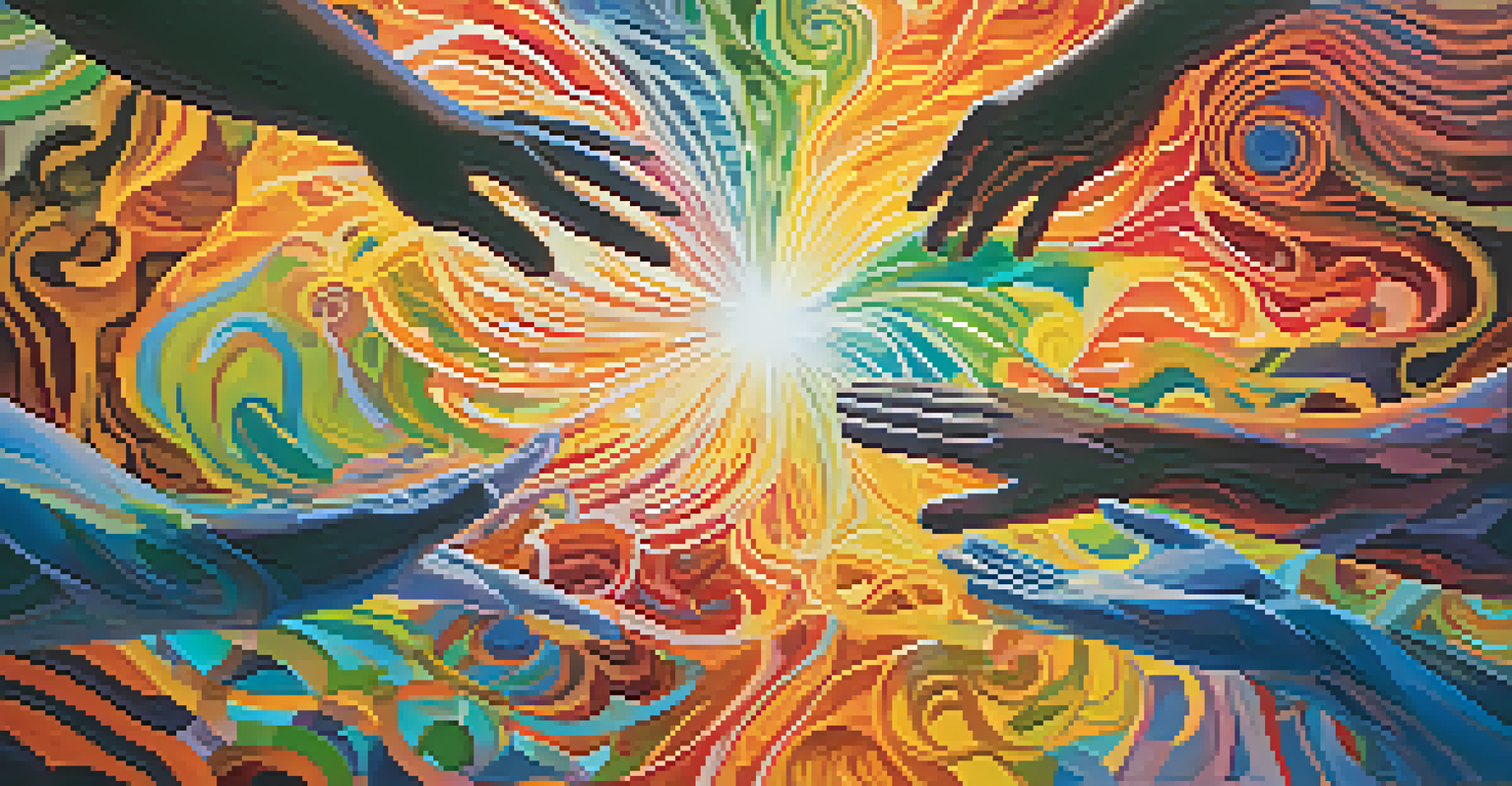Can Hallucinogens Increase Our Capacity for Empathy?

Understanding Hallucinogens and Their Effects
Hallucinogens, like psilocybin and LSD, are substances that alter perception, mood, and cognitive processes. They can create profound experiences that some users describe as life-changing. These substances can lead individuals to see the world through a different lens, often sparking intense emotional responses.
The greatest thing in the world is to know how to belong to oneself.
The effects of hallucinogens can vary greatly from person to person, influenced by factors like dosage, setting, and individual mindset. In some cases, users report feelings of interconnectedness with nature and others, which can open new emotional avenues. This heightened state of awareness can lead to increased introspection and empathy.
Research into the effects of hallucinogens on the brain suggests that they may enhance neural connectivity, allowing for new perspectives and emotional responses. By breaking down conventional thought patterns, they may help individuals tap into feelings they might not usually access, potentially fostering greater empathy.
The Science Behind Empathy and Brain Function
Empathy, the ability to understand and share the feelings of others, is a complex emotional response that involves various regions of the brain. The anterior insula and the anterior cingulate cortex are key players in processing empathy, allowing us to connect emotionally with others. However, factors like stress and anxiety can dampen these abilities.

Studies suggest that hallucinogens can increase activity in these empathy-related areas. By promoting a more relaxed and open state of mind, they may enable individuals to engage more fully with the emotions of others. This neurological shift could lead to improved interpersonal relationships and social cohesion.
Hallucinogens Enhance Empathy
Substances like psilocybin and LSD have been shown to increase feelings of empathy and emotional connection in users.
Moreover, when individuals experience altered states of consciousness, they often report a greater sense of compassion and understanding. This phenomenon may be attributed to the hallucinogenic experience itself, which promotes a feeling of unity with the universe and all its inhabitants, making empathy not just a reaction but a deeply felt experience.
Historical Context: Empathy and Hallucinogens
Historically, various cultures have used hallucinogens in rituals to foster community and empathy. Indigenous tribes often consumed psychedelic plants to promote social bonding and understanding among tribe members. These practices highlight the long-standing belief in the ability of these substances to enhance emotional connections.
We are all made of star-stuff. We are a way for the universe to know itself.
For example, the use of ayahuasca in Amazonian shamanic traditions has been linked to transformative experiences that deepen personal and communal empathy. Participants often report sharing profound feelings and insights during these ceremonies. Such practices suggest that hallucinogens have been viewed as tools for enhancing empathy long before modern science took interest.
In contemporary contexts, there’s a growing interest in therapeutic uses of psychedelics to treat mental health issues. As researchers uncover the potential for these substances to enhance emotional well-being, the connection between hallucinogens and empathy becomes even more relevant.
Modern Research: Hallucinogens and Empathy Enhancement
Recent studies have begun to investigate whether hallucinogens can indeed increase empathy. Clinical trials involving psilocybin have shown promising results, with participants reporting heightened feelings of compassion and understanding after sessions. These findings are sparking interest in how psychedelics could play a role in emotional therapy.
For instance, a study published in 2021 found that individuals who took psilocybin showed increased empathy levels and improved emotional processing. The implications of such research could extend to various therapeutic contexts, including treatment for PTSD and depression, where empathy plays a crucial role in healing.
Cultural Use of Psychedelics
Historically, various cultures have used hallucinogens in rituals to promote social bonding and understanding among community members.
As this field of study progresses, it becomes increasingly important to explore the ethical considerations surrounding the use of hallucinogens. Ensuring that these substances are used responsibly and in supportive environments is essential to maximize their potential benefits for empathy enhancement.
Challenges and Risks of Using Hallucinogens
Despite the promising insights, using hallucinogens for empathy enhancement is not without challenges. Not everyone responds positively to these substances; some may experience anxiety, paranoia, or distressing thoughts during their trips. Such experiences can hinder the very empathy that these substances are believed to enhance.
Additionally, the context in which hallucinogens are used significantly affects outcomes. A supportive environment is critical to ensure that individuals can process their experiences positively. Without guidance, the potential for adverse reactions increases, which can overshadow any positive effects on empathy.
Furthermore, there is still much to learn about the long-term effects of hallucinogen use. While some individuals may experience lasting increases in empathy, others may not. Ongoing research is necessary to clarify these effects and to understand how to harness hallucinogens safely and effectively.
Personal Stories: Transformative Experiences
Many who have experimented with hallucinogens share transformative stories that highlight increased empathy. For example, individuals often recount moments during their experiences where they felt a profound connection to others, leading to a greater understanding of their struggles. These stories illustrate the potential of hallucinogens to foster deep emotional connections.
One participant in a psilocybin study described feeling an overwhelming sense of love and compassion for everyone around them. This emotional awakening not only shifted their perspective on relationships but also inspired them to engage more actively in community service. Such anecdotes underscore the potential benefits of hallucinogens in promoting empathy.
Research Validates Healing Potential
Recent studies suggest that hallucinogens may play a significant role in therapeutic settings, particularly for enhancing emotional well-being.
However, it's essential to remember that these experiences can vary widely. While some may come away with heightened empathy, others may not have the same outcome. These personal stories serve as a reminder that the relationship between hallucinogens and empathy is complex and worth exploring further.
Conclusion: The Future of Empathy and Hallucinogens
As research continues, the potential for hallucinogens to enhance empathy opens up exciting possibilities for mental health and personal growth. The idea that these substances can foster deeper emotional connections is both intriguing and hopeful. However, responsible use and further investigation are critical to ensuring safety and efficacy.
The future may hold new therapeutic approaches incorporating hallucinogens to help individuals develop greater empathy, particularly in a world increasingly divided by misunderstanding. By fostering compassion and connection, these substances could play a role in healing both individuals and communities.

Ultimately, while the journey to understanding the relationship between hallucinogens and empathy is ongoing, it reflects a broader desire for connection in our increasingly complex world. The exploration of this connection could not only benefit individual well-being but also contribute to a more empathetic society.